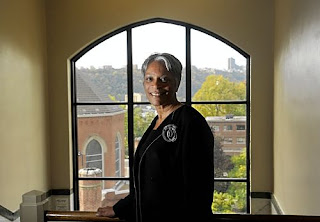
The Thinkers: Teachers offered a lesson in urban vernacular:
"Arnetha Ball recalls a time when a teacher in a mostly African-American classroom was taking roll and asked if a particular student was absent.
'No, he's not here,' a girl in the class said. 'He be missing the bus.'
The teacher corrected her. 'You mean, he missed the bus.'
'Well,' the girl replied, 'he missed the bus, but that's not what I was saying.'"
By using that particular piece of African-American vernacular, the girl actually meant "he misses the bus all the time," said Dr. Ball, a Stanford University expert in educational linguistics and the inaugural Dr. Barbara A. Sizemore distinguished professor at Duquesne University's School of Education.
Dr. Ball said teachers, especially those in urban schools across the nation, need to start understanding that African-American speech is its own language, with specialized words, grammar and ways of communicating.
"People may think it's all about slang," she said, "but it goes much deeper."
In the case of the roll-call anecdote, when the student said "he be missing the bus, she meant it's a habitual pattern, so when she was corrected by the teacher, she was aware that was not what she had meant to say."
As with any language, she said, "there's a much richer meaning if you can understand the intended colloquial meanings that go with the expressions."
Her years of research on the subject have not been aimed at promoting African-American vernacular at the expense of standard, academic English, but to show how understanding its patterns can enhance communication and teaching.
Read more: http://www.post-gazette.com/pg/09306/1010095-53.stm#ixzz0ViYPYmSo
"Arnetha Ball recalls a time when a teacher in a mostly African-American classroom was taking roll and asked if a particular student was absent.
'No, he's not here,' a girl in the class said. 'He be missing the bus.'
The teacher corrected her. 'You mean, he missed the bus.'
'Well,' the girl replied, 'he missed the bus, but that's not what I was saying.'"
By using that particular piece of African-American vernacular, the girl actually meant "he misses the bus all the time," said Dr. Ball, a Stanford University expert in educational linguistics and the inaugural Dr. Barbara A. Sizemore distinguished professor at Duquesne University's School of Education.
Dr. Ball said teachers, especially those in urban schools across the nation, need to start understanding that African-American speech is its own language, with specialized words, grammar and ways of communicating.
"People may think it's all about slang," she said, "but it goes much deeper."
In the case of the roll-call anecdote, when the student said "he be missing the bus, she meant it's a habitual pattern, so when she was corrected by the teacher, she was aware that was not what she had meant to say."
As with any language, she said, "there's a much richer meaning if you can understand the intended colloquial meanings that go with the expressions."
Her years of research on the subject have not been aimed at promoting African-American vernacular at the expense of standard, academic English, but to show how understanding its patterns can enhance communication and teaching.
Read more: http://www.post-gazette.com/pg/09306/1010095-53.stm#ixzz0ViYPYmSo
